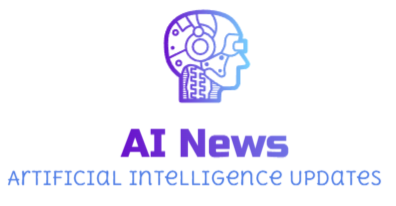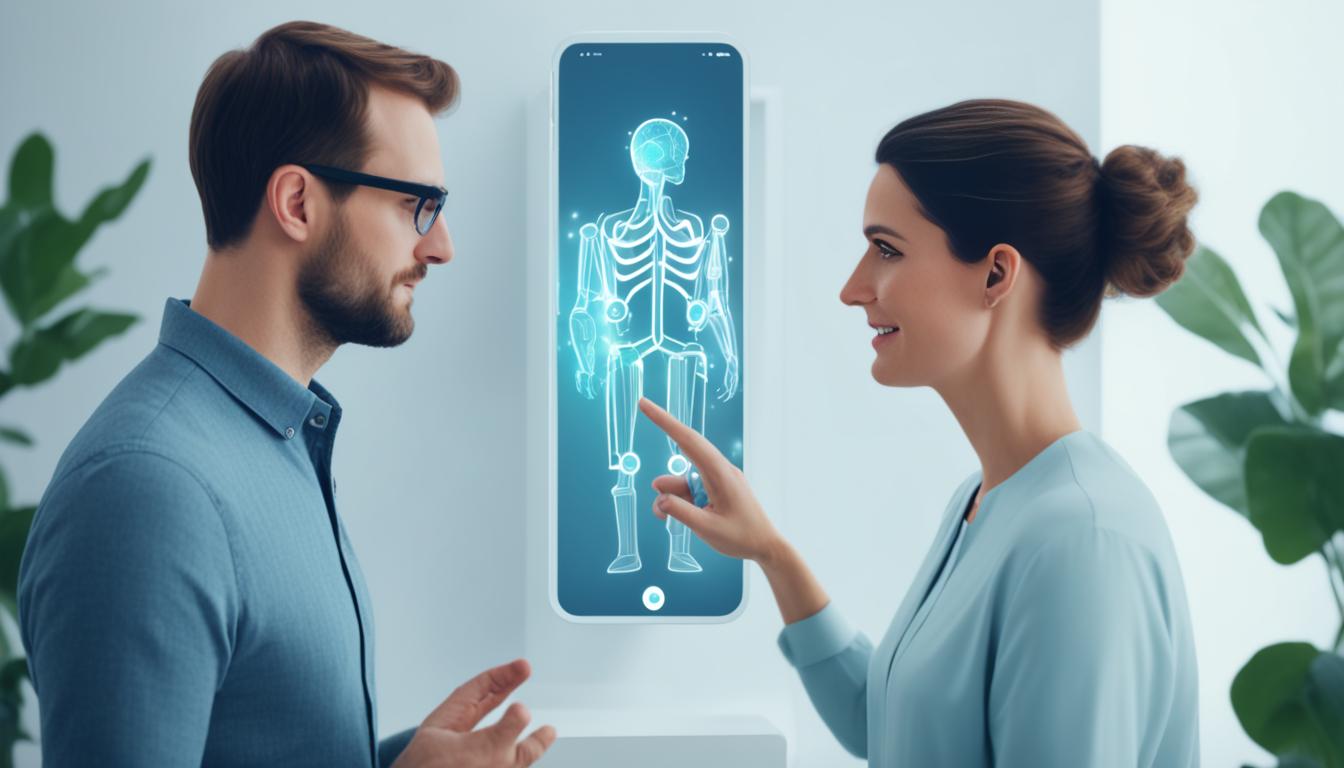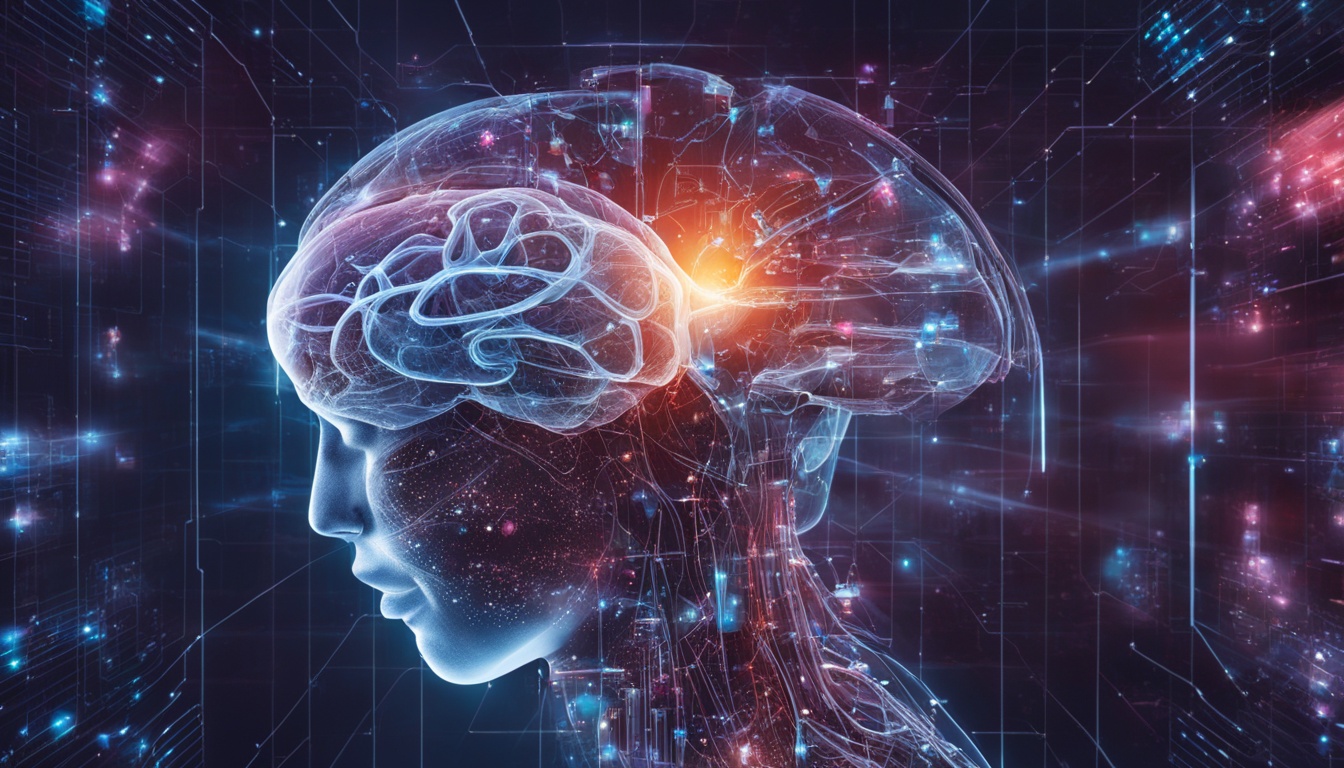Artificial intelligence (AI) is changing healthcare, especially in mental health. It helps with diagnosis, analyzes data, and watches over patients in real-time. It’s key for doctors to keep up with AI’s growth and its limits.
Mental health issues are complex, and we don’t have enough data. This makes it hard to use AI fully. There are also worries about privacy, bias, and AI taking over human care. We need rules and doctors to make sure AI is used right.
Key Takeaways
- AI is changing mental healthcare by helping with diagnosis, treatment, and watching over patients.
- Challenges include the complexity of mental health, limited data, privacy concerns, and the risk of bias.
- Working together between AI and human doctors is key for good and fair use.
- Rules are important to make sure AI in mental health is used right.
- Using AI in mental health could make care better and more tailored to each patient.
Introduction to AI in Mental Health
AI is changing fast, and it’s becoming a big part of mental health care. Doctors and health workers need to keep up with AI’s growth and its limits. Mental health disorders are complex and hard to measure, making it tough to use AI.
Old studies and limited data slow down AI research in mental health services. There are also worries about privacy, bias, and replacing human caregivers. The COVID-19 pandemic made more people need mental health services, putting a strain on healthcare systems. AI could help make mental health care better and more accessible.
Challenges in Accessing Mental Health Services
Suicide is now the fourth leading cause of death for people 15-29 years old worldwide. This shows we need to fix the challenges accessing mental health care fast. AI could help make mental health care more available, especially in places that don’t have much access. But, we need to make sure AI works well with human care to help patients the best way possible.
AI Therapists and Chatbots
AI-powered mental health chatbots have changed the game, making emotional support easy to get. Woebot and Tess are at the forefront, offering personalized help, empathetic talks, and knowing when you need a human.
These AI therapists tailor their approach to fit your personality. They use natural language processing and machine learning for chats that feel human. This means you get help any time you need it, even when in-person help isn’t available.
The aim of AI therapy chatbots is to make mental health care more accessible. They’re not meant to replace human therapists, but they can be a big help. These AI agents are great tools for improving mental health.
Wearables and Sensor Technology in Mental Health
New *mental health wearables* and sensor technology are changing how we handle mental health care. Devices like Biobeat use advanced sensors to track things like sleep, activity, and heart rate. They look for small changes that might mean mental health issues are coming, helping to start treatment early.
Wearables and AI work together to give doctors clear, data-based insights on a patient’s mental health. This info helps doctors use more than just old-school methods to figure out and treat mental health problems. It lets people take charge of checking their mental health, which can make them more involved in their care. This could lead to better patient results.
Diagnostic and Predictive Applications of AI
Artificial intelligence (AI) is changing the game in mental health care. It’s making a big impact with diagnostic and predictive applications. These tools are changing how we handle mental health, from AI mental health diagnosis to suicide risk prediction.
Using Machine Learning for Mental Health Diagnosis
Machine learning algorithms are now key in mental health care. They look at many types of data, like medical records and brain scans. This helps spot conditions like depression and anxiety better than humans can.
These AI mental health diagnosis tools catch things we might miss. They help doctors make quicker and more accurate diagnoses.
Predicting Patient Outcomes and Suicidal Ideation
AI is also great at predicting how patients will do in the future. It looks at things like medical records and online behavior. This AI mental health prediction can lead to earlier help and better treatment plans.
This could really improve how well patients do and their overall happiness.
AI in Mental Health
AI technology is changing mental healthcare for the better. It uses predictive algorithms to spot when a patient might not follow their treatment plan. This could mean missing therapy or not taking medicine as directed. Healthcare providers can then take steps to fix these issues early.
AI helps improve patient compliance by sending out reminders and alerts. AI mental health compliance systems watch how patients act and send messages to both the patient and their team. This helps keep treatment on track and stops patients from falling behind.
AI also looks for patterns that might lead to compliance problems. By checking a patient’s history and digital tracks, AI can find early signs of trouble. Then, it can offer tailored advice to help patients stick to their treatment plans. This makes mental health care more effective and leads to better results.
Personalized Mental Health Treatments with AI
The future of mental health care is changing thanks to AI technology. Researchers use AI to make personalized mental health treatment plans for conditions like schizophrenia. AI watches patients’ symptoms and how they react to treatments. This helps doctors make better care plans for each person.
This “explainable AI” method aims to make personalized therapies clear and easy for doctors to understand. The aim is to offer treatments that fit each patient’s specific needs. This leads to better and more tailored mental health care.
As AI personalized treatment grows, researchers are improving the algorithms and data models. They use machine learning and predictive analytics to understand patients better. This helps mental health experts find the best treatments for each patient.
Challenges and Limitations of AI in Mental Health
AI in mental health is growing fast, but it faces big challenges. One big worry is that AI might keep the biases in the data it learns from. This could lead to wrong or unfair results. It’s key to fix these AI bias mental health problems and make sure the data is good and diverse.
Subjectivity in Mental Health Diagnosis
Diagnosing mental health needs doctors to understand what patients feel and say. This is different from physical health, where things can be measured directly. AI has a hard time with this subjectivity mental health diagnosis because it lacks the human touch in understanding and spotting patterns.
AI tools can help mental health experts a lot, but they’re not a full replacement for human doctors. It’s important to use AI and human skills together. This way, we can get the best care for mental health.
Ethical Considerations and Governance
AI is becoming more important in mental health care, bringing up big ethical questions. Keeping patient mental health info safe is key. There’s worry that AI might take over human jobs, leaving those who need care without the personal touch humans offer.
Ethics AI mental health and AI mental health governance are vital. We need clear rules and oversight to make sure AI is used right. It’s important to work together to use AI’s benefits while avoiding its risks.
As AI becomes more common in mental health care, keeping people’s trust is crucial. We must create strong ethical rules and good governance. This way, patients know their mental health is in safe, caring hands – with humans, AI, or both.
Conclusion
AI is changing mental healthcare in big ways, making it more efficient and effective. But, we must be careful with AI to make the most of its benefits. We need to think about the challenges and limits of using AI in mental health.
It’s important to tackle issues like bias and the quality of data. We also need to consider how mental health is diagnosed. Working together, AI experts and doctors can create tools that help patients without causing harm. The future of AI mental health looks promising if we’re careful and open about how we use it.
As AI mental health grows, we must use it to improve mental healthcare for everyone. By combining human knowledge with AI, we can find new ways to help people feel better. This approach will lead to better mental health for individuals and communities.





